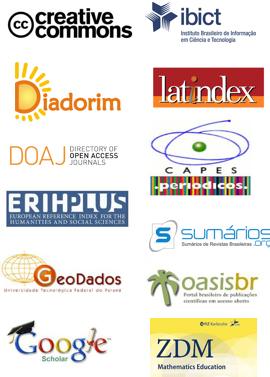ALBANIAN STUDENTS’ PREFERENCES FOR REAL-LIFE SITUATIONS IN MATHEMATICS AND ITS GENDER AND SCHOOL LOCATION DIMENSIONS
DOI:
https://doi.org/10.17921/2176-5634.2013v6n1p%25pResumo
This study reports the investigation of students’ preferences for real-life situations used in mathematics. Participants were 8th -10th grades students from different lower and upper secondary schools in the district of Shkodra, Albania, with balanced gender participation. Rasch rating scale methods were used to analyse the data collected with a questionnaire. This method allowed the investigation of whether the data fit the Rasch model according to the appropriate criteria. It concluded that students revealed a hierarchy of preferences of contextual situations used in Mathematics. Items related to students’ affiliation with modern technologies were highly preferred, followed closely by items perceived as connected to a safe economic future and upward mobility and entertainment. At a middle range were items about more global concerns such as environmental matters. The least preferred items represent activities perceived as unprofitable in the current stage of the Albanian societal development. Four items exposed differential item functioning for girls and boys, and two items exposed differential item functioning according to school location. The use of the concepts of habitus, field, and capital from Bourdieu as heuristic tools to explain students’ motives for preferences revealed that being educated is seen as necessary capital for a good position in students’ future fields of higher education and employment. Therefore students show positive dispositions toward items that are perceived as helpful in this direction.Downloads
Publicado
2015-06-18
Como Citar
Kacerja, S. (2015). ALBANIAN STUDENTS’ PREFERENCES FOR REAL-LIFE SITUATIONS IN MATHEMATICS AND ITS GENDER AND SCHOOL LOCATION DIMENSIONS. Jornal Internacional De Estudos Em Educação Matemática, 6(1). https://doi.org/10.17921/2176-5634.2013v6n1p%p
Edição
Seção
Artigos


